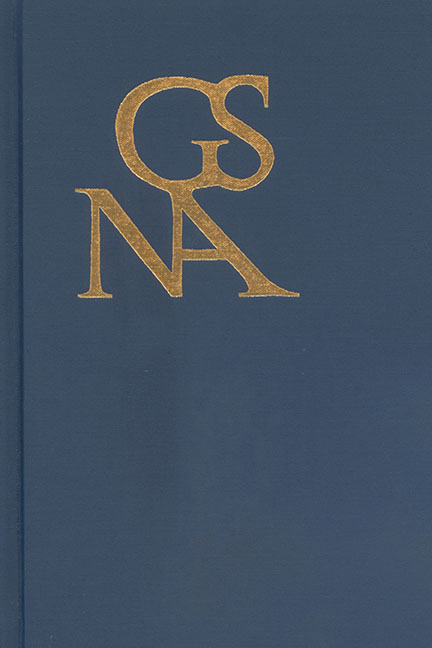Christiane Frey. Laune: Poetiken Der Selbstsorge Von Montaigne Bis Tieck. Paderborn: Fink, 2016. 317 Pp.
Published online by Cambridge University Press: 28 October 2020
Summary
A cursory glance at some of the more recent philosophical lexica and dictionaries will, in all likelihood, accord little attention to the seemingly fleeting and capricious concept that lies at the heart of Christiane Frey's study on Laune. Mood, or Laune—as distinguished from the more philosophically resonant and exalted concept of mood as attunement, or Stimmung—does not have its own entry in Ästhetische Grundbegriffe (2000–2005) or in the more recent Dictionary of Untranslatables (2014).
And yet, it is a significant term in the history of aesthetics and itself an untranslatable term, one whose contours Frey approaches with great erudition, flair, and mercurial agility. It flits around Stimmung, it circles the French humeur and the English humour, it brushes up against Genie, is tempted by caprice, and moves among various and often contradictory modes of appearance—both conscious and unconscious, purposive and arbitrary—on the margins of dominant aesthetic and anthropological discourses of the eighteenth and early nineteenth centuries.
Perhaps it is all for the best that mood, as Laune, is no longer to be found in the compendia of dominant philosophical and aesthetic concepts, since, as Frey shows us, its potential and its power derive precisely from its peripheral status, its “parasitic” position vis-à-vis dominant discourses. By occupying a liminal position between activity and passivity, freedom and unfreedom, knowledge and the lack of knowledge, masculinity and femininity, mood harbors a power of deviation from the generality of the norm. As a figure that often resists universalization, mood becomes a discursive repository of anthropological and aesthetic operations that are unpredictable and idiosyncratic.
In Frey's study, mood as Laune is thus closely aligned with the aesthetics of the comic, above all with the particularizing tendencies within the comic that cannot be integrated into higher orders of transcendence. In a coda to her study, Frey draws attention to Jean Paul's concept of mood, which he denigrates in favor of humor: unlike humor, which brings the finite individual into a contrastive relationship with the infinite idea, mood as Laune contrasts the finite particularity only with that which is finite. Although resistant to its pull—or perhaps precisely because of this resistance—Jean Paul uncovers the potentiality of Laune, namely, as the means through which the particularity of the particular, rather than the particular in relation to a generality, is accorded a space of appearance.
- Type
- Chapter
- Information
- Goethe Yearbook 27 , pp. 359 - 361Publisher: Boydell & BrewerPrint publication year: 2020



